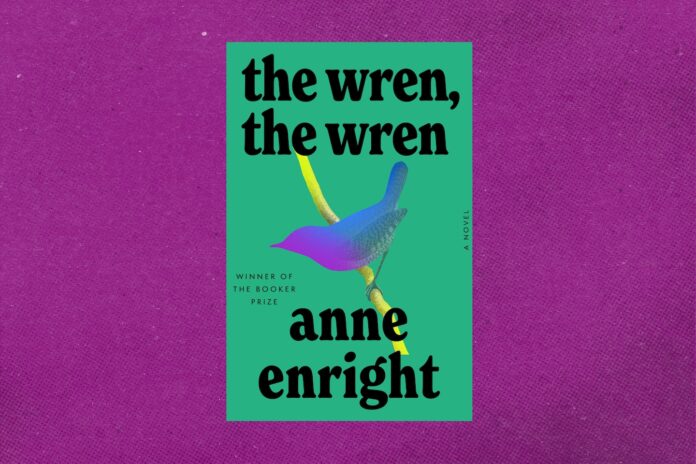Phil McDaragh walked out on his wife when she was in bed recovering from breast cancer surgery. A celebrated Irish poet, he was famous for his beautifully sad love poetry and keen understanding of women; he wooed them with words and hurt them with words — spoken or written.
The novel gives voice to Nell, his granddaughter, and Carmel, his daughter, in alternating chapters. Phil himself is given the shortest one, a childhood memory of his first infatuation with a classmate, Hanorah, as a 10-year-old in his native Irish village. His feelings for her are ignored until he finds a way to engage her interest and she agrees to take a walk with him. A motherless girl with a strict father, she is swiftly punished by having her long black plait cut off: “It had been cut to a raggedy short length at the base of her skull.” Her desirability gone, the girl is mocked by the children, with Phil’s particularly cruel participation: “I jeered her too. This creature. I threw a clod of grass that hit her narrow, bare calf. The girl I had once loved, I now deplored.” A lifetime later, she may be among the many mourners at his funeral, when his body is returned home from America.
Nell, Phil’s 23-year-old granddaughter living in present-day Dublin, doesn’t know much about her once-famous grandfather, although she has often leafed through his books of poems. Her chapter is written in Nell’s thoughtful, lively, funny, always sincere and often self-deprecating voice. If the internet is supposed to have caused a general dumbing-down, Enright shows how, on the contrary, in the hands of a truly inquisitive and deeply intelligent and creative mind like Nell’s, it can be a window into ourselves.
Nell reflects, playfully and philosophically, on everything she finds online, from a psychologist’s experiments aimed at understanding our inner lives to clips of snails having sex: “So, this is me. I look at a video of a talking raven while my friend Lily worries about fascism, and while my friends are breaking the back of the patriarchy I start to cry about the unbearable fate of the bees.” Every sentence she writes has the vividness of a true literary voice, and she is indeed always thinking of books or blogs she might like to write. At the moment, she earns money by producing “content” online. Nell writes a very convincing travel blog about places she has never visited and ghostwrites a famous influencer’s online voice. When she gets it too right by describing the heartbreaking sadness of a failed pregnancy, she is fired. I would buy a book of Nell’s throwaway observations: “A revelation is the way things make sense when we are wired for some kind of knowledge, but not yet switched on.” She writes this down “with an actual pen.”
“The Wren, the Wren” of the book title is also the title of a poem Phil had dedicated to Carmel. It is about the bird flying away from him, out of his hand: “her ascent/away from me/in a blur of love, to love/indistinguishable/… And, oh/my life, my daughter,/the far away sky is cold/and very blue.”
Phil and his granddaughter are equally fascinated by the poetic beauty of birds, and equally emotionally loyal to Irish birds. But his poem about the wren is the ultimate in deceit, poetic or otherwise, because it masks his own desertion of Carmel. She never had the chance to “fly away” — he left her first and never returned.
Carmel’s life is told in her own chapters but, unlike Nell’s, in the third person. While her mother and older sister continue to live in a sort of denial of Phil’s absence, Carmel rejects all forms of pretense and grows up to be fiercely independent and outspoken. She chooses to become a single mother, with a few surprising relationships, none of which are necessary for her well-being. All she needs is Nell, whom she thinks of as entirely her own. In the most powerful scene in the novel, the love between Carmel and Nell as a child turns into a physical fight when Carmel loses her temper one day. This moment of violence triggers the memory of her father: “Her father was bigger than the world and a lot less wonderful. He was vast, like a wall.”
Ireland is the ever-present soul of every story Enright tells in “The Wren, the Wren.” The novel is interspersed with translations of old Irish poetry — each poem is in direct counterpoint to or an accent on her themes. Far from feeling ancient, these poems have a language of their own that transcends time. Like the novel itself, they sing with grace and beauty and hard-hitting truth.
Phil reappears, if briefly, in both Carmel’s and Nell’s lives when each watches an old interview of him on YouTube, recorded two years before his death. It affects them deeply yet very differently, though they have one reaction in common: They acknowledge a real connection they feel to this man, with all his flaws. But when he says he thinks “all poetry is about unrequited love,” he may be talking only about himself.
Elena Lappin is the author of the story collection “Foreign Brides,” the novel “The Nose” and a memoir, “What Language Do I Dream In?”
W.W. Norton. 288 pp. $27.95
A note to our readers
We are a participant in the Amazon Services LLC Associates Program,
an affiliate advertising program designed to provide a means for us to earn fees by linking
to Amazon.com and affiliated sites.



